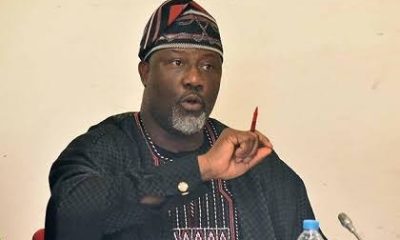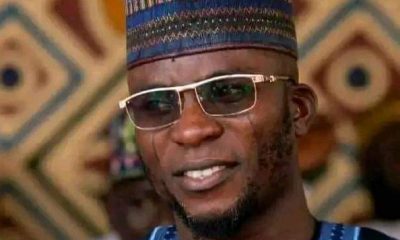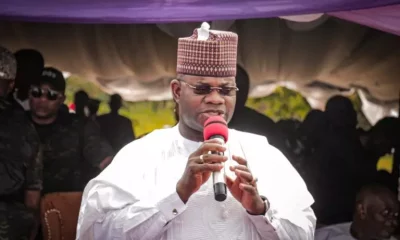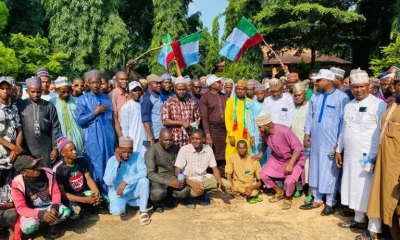Headline
Ignore false alarm on insecurity – Kogi Govt. urges citizens, travellers
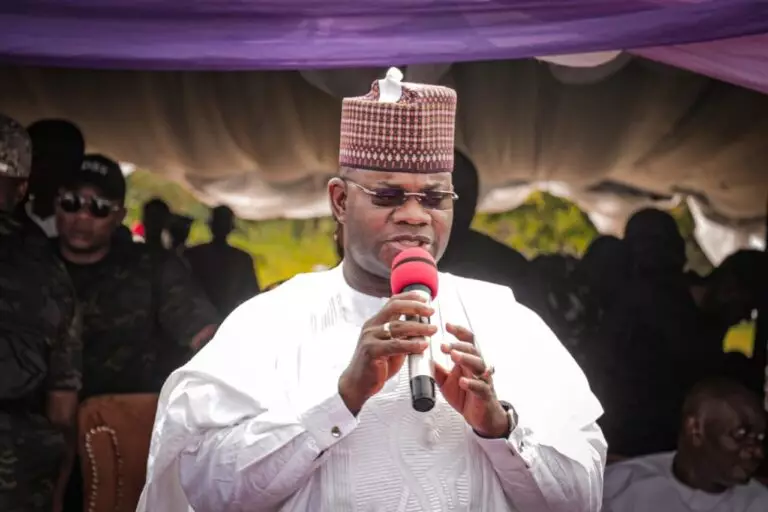
Kogi Government has urged citizens and travellers to ignore false alarm on insecurity circulating that the state is not safe.
Retired Commodore Jerry Omodara, Security Adviser (SA) to Gov. Yahaya Bello of Kogi, made the call while speaking with the News Agency of Nigeria (NAN) in Lokoja.
An alarm in in form of a notice in circulation in the state claims, “Kogi State is hot for now. For those visiting kogi State to see family and friends please avoid this areas, Jimgbe, Elete, Emoro, Geregu down to Ajaokuta.
“Also, avoid Obajana old road. Even if you are stick in traffic due to the new bridge construction, please avoid the old road, it’s very dangerous.”
Omodara said there was the need to caution people, to avoid believing in unconfirmed reports like that, especially when it had to do with security in Kogi.
“As things are in terms of security, there is such thing happening in Kogi. It’s all but falsehood.
“Trust us, we will not give anyone the chance to torment the people of Kogi as it used to be in the past. As it is, there is no cause for alarm as long as Kogi State is concerned.
“This is because criminals coming into the state are quickly harvested. We are harvesting them even with those who ran to other states as we ensure we go after them and bring them back to face prosecution.
“All we expect from the public is timely information and the security agencies will do their job, ” he said.
The security adviser explained, “it’s true you can’t completely eliminate criminality in any society, but the compact system of neighborhood and the security architecture put in by the Federal Government in Kogi is working very well along with the will power of the Kogi Government to deal with the emerging security situation.
According to him, “If we have one or two security challenges, be sure we have nipped 6 or 7 or 8 in the bud.”
He said for the fact that there was an incident recently, people should stop enlarging it as if it was a threat to wellbeing of residents and passers-by.
“We all know what the security situation in Kogi was and what we are having now.
“The government of Gov Bello has been able to bring sanity in Kogi, where the people are very free, doing their legitimate businesses without any fear of harassment.
“Therefore, rather than escalating falsehood on social media, it’s better you channel information, whenever you discovered any security challenge or breach to the security operatives for prompt action,” he advised.
Omodara expressed gladness that the government and security operatives were getting it well in Kogi.
“Till the last day of Alh. Yahaya Bello in office as governor, and even to the next government, we will continue to fight insecurity in Kogi for the good of our people.”
Headline
Fagbemi warns against obstructing EFCC from performing its lawful duty

The Minister of Justice, Lateef Fagbemi, SAN has warned against obstructing the Economic and Financial Crimes Commission (EFCC) from carrying out its lawful duty .
Fagbemi’s warning is contained in a statement in Abuja.
“This is a matter of very grave concern, it is now beyond doubt that the EFCC is given power by the law to invite any person of interest to interact with them in the course of their investigations into any matter, regardless of status.
“Therefore, the least that we can all do when invited, is not to put any obstruction in the way of EFCC, but to honourably answer their invitation.
“A situation where public officials who are themselves subject of protection by law enforcement agents will set up a stratagem of obstruction to the civil and commendable efforts of the EFCC to perform its duty is to say the least, insufferably disquieting’’.
He added that running away from the law will not resolve issues at stake but only exacerbate them.
“Nigeria has a vibrant judicial system that is capable of protecting everyone who follows the rule of law in seeking protection.
“I therefore encourage anyone who has been invited by the EFCC or any other agency to immediately toe the path of decency and civility by honouring such invitation instead of embarking on a temporising self-help and escapism.
“This can only put our country in bad light before the rest of the world’’.
He said institutions of state should be allowed to function effectively and efficiently.
“I stand for the rule of law and will promptly call EFCC, and indeed any other agency to order when there is an indication of any transgressions of the fundamental rights of any Nigerian by any of the agencies’’.
NAN reports that the EFCC had on Wednesday warned members of the public that it was a criminal offence to obstruct officers of the Commission from carrying out their lawful duties.
Section 38(2)(a(b) of the EFCC Establishment Act makes it an offence to prevent officers of the Commission from carrying out their lawful duties. Culprits risk a jail term of not less than five years.
The warning , the EFCC said, became necessary against the background of the increasing tendency by persons and groups under investigation by the Commission to take the laws into their hands by recruiting thugs to obstruct lawful operations of the EFCC.
On several occasions, the anti graft agency said, operatives of the Commission have had to exercise utmost restraint in the face of such provocation to avoid a breakdown of law and order.
Headline
Unknown Gunmen Abduct Channelstv Reporter In Port-harcourt

Some unknown gunmen have kidnapped Joshua Rogers, the ChannelsTV reporter in Port-Harcourt, the Rivers State capital.
Politics Nigeria learnt that Rogers was picked up close to his residence at Rumuosi in Port Harcourt and to an unknown destination by the gunmen around 9pm on Thursday, April 11.
The reporter was driving his official ChannelsTV branded car when the hoodlums accosted, pointed a gun at him and took him away in the same vehicle.
Rogers was said to be returning from his official assignment in Government House after a trip to Andoni for a government event when the incident happened.
Already, the gunmen were said to have contacted his wife and demanded a N30million ransom for bis release.
His cameraman confirmed the incident and appealed to his abductors to set him free unconditionally.

